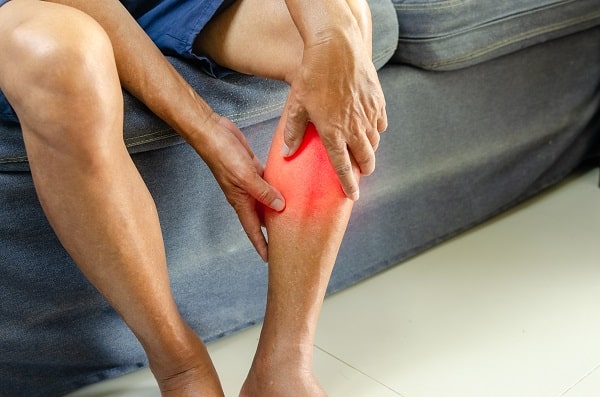Do you ever get muscle cramps? You know, those sudden and unexpected twitches or jerks in your muscles? Unfortunately, muscle cramps are a common problem, especially in the feet and legs. And while there are many different reasons why this might be happening, this article will look at some of the most common causes. It will also provide tips on preventing or treating muscle cramps. So if you’re looking for some answers and want to free yourself of this uncomfortable condition, keep reading.
Contents
What Is Happening During A Muscle Cramp?

Muscle cramps can be excruciating, often occurring without warning and leaving an intense sensation that lingers long after the cramp has subsided. This can leave many people wondering what is happening in their bodies during a muscle cramp. In short, these cramps occurs when a muscle contracts too strongly and does not relax, leading to prolonged tightness and spasms.
Technically speaking, a muscle cramp is known as a ‘spasm’, and it is caused by an involuntary contraction of the muscle fibers. When tightened too much, these fibers can become overstimulated and cause severe pain in the area. The cramp’s severity depends on various factors, such as how long it lasts, how forcefully the muscle contracts, and what muscles are involved.
Common Causes Of Muscle Cramps
For those experiencing this frequently, it can be helpful to understand the most common causes of muscle cramps. This can help you narrow down what could be causing your cramps and better address them. Here is a look at some of the different things that can bring this about:
Dehydration

Dehydration is a major factor when it comes to muscle cramps. For instance, not consuming enough water can quickly decrease the electrolyte balance in your body, leading to tighter muscles and eventual cramps. On the flip side, staying ahead of dehydration through proper hydration can keep electrolytes in check and minimize the risk of cramps.
It’s important to remember that consuming fluids alone isn’t enough; you’ll also need electrolyte-rich foods such as nuts, fruits, and green leafy veggies in order to feel your best. All things considered, understanding how dehydration can affect your muscles and taking steps to stay hydrated are essential for maintaining good physical health.
Electrolyte Imbalance

As the previous section mentioned, electrolytes can play a significant role in muscle cramps. Electrolytes are minerals that help regulate how your body operates and are essential for good health. When electrolyte levels become unbalanced, it can cause muscles to contract too strongly and lead to cramps.
This is why it’s important to keep an eye on your electrolyte levels and ensure you are consuming them in adequate amounts. If you find that your cramps persist, speak to your doctor about possible electrolyte deficiencies or imbalances.
Muscle Fatigue

Another common cause of these cramps is muscle fatigue. Overtaxing the muscles can lead to tightness and spasms, which can happen if you overexert yourself physically or even mentally. Taking regular breaks throughout the day to rest your muscles can help keep them from becoming overtired, as can stretching and other forms of exercise.
Muscle fatigue is also associated with prolonged sitting, so getting up and moving regularly throughout the day is important. This will help keep your muscles active and prevent them from becoming too tired or tight.
Diabetes

As anyone affected by diabetes knows, it is a chronic and complicated condition. One of the potential side effects of it can be muscle cramps, which can range in intensity from occasional twitches to incapacitating pain. Diabetes can cause muscle cramps because the body isn’t able to convert sugar effectively into energy that the muscles need.
This shortage of energy leads to both fatigue and cramping in the muscles, making it crucial for diabetics to pay attention to their blood sugar levels, as this could be a signal for needed action. Generally, monitoring blood sugar closely and staying hydrated are practical steps toward preventing or relieving cramping.
Certain Medications

Muscle cramps can also be a painful side effect of certain medications. It’s important to recognize the potential for a medication to cause cramping to protect yourself from discomfort. Many different types of medications have the potential to induce cramps in your muscles, ranging from heart and cholesterol medications to those prescribed for arthritis.
In most cases, muscle cramps related to medication are usually mild and decrease over time as the body adjusts. Nonetheless, if you experience this kind of side effect while taking a specific medication, you should speak with your doctor as soon as possible so they can provide helpful advice or switch prescriptions.
Stress

The human body is a complex system, and many people don’t often consider how stress affects their tissues and muscles. But it does! Stress can contribute to muscle cramps by creating a surge of cortisol in the bloodstream, increasing muscle tension and making them contract more than usual, leading to overworked muscles that are more prone to strain and tightening.
Additionally, this type of physiological pressure can affect your sleep patterns, further contributing to fatigue and muscle aches and spasms. Although stress isn’t always guilty of causing those painful leg cramps, it is a factor to consider when examining your overall health.
Involuntary Nerve Discharge

Your muscles are maintained and regulated by a complex neurological system involving involuntary nerve discharge. So when this system fails to properly control muscle contractions, spasmodic pain can result in the form of a muscle cramp. Through the lens of neuroscience, you can view muscle cramps as an imbalance between excitatory impulses from nerves and inhibitory activity from the brain that prevents too much contraction of muscles.
This tension between inhibition and excitation is essential for proper movement. Still, some conditions, such as fatigue, stress, or dehydration, can lead to inequities causing involuntary nerve discharge to overpower the brain’s inhibitory signals resulting in uncomfortable or even painful muscle cramps.
Tips To Prevent Muscle Cramps

Addressing the issues above is essential for preventing muscle cramps. But there are other steps you can take to help ensure your muscles don’t suffer from unwanted contractions:
• Stay hydrated by drinking plenty of fluids throughout the day
• Eat a balanced diet full of nutritious foods
• Regularly incorporate stretching into your routine
• Get enough sleep
• Regularly exercise to help keep muscles loose and flexible
By making these simple changes to your lifestyle, you can reduce your risk of developing muscle cramps and keep your muscles healthy.
Take Steps To Avoid Muscle Cramps!
Muscle cramps can be an incredibly painful and disruptive experience, but understanding what causes them can help you take the necessary steps to prevent future cramping. Whether through changes in your diet or lifestyle, taking the time to address these issues can make a big difference in protecting yourself from muscle cramps. Ultimately, it’s important to remember that muscle cramps are usually a sign of deeper health issues, and it’s always best to consult with a medical professional if the discomfort persists or worsens. With proper care and attention, you can help ensure your muscles stay healthy and free from painful cramping.



magnesium and fluids all you need
I get them when I haven’t enough salt. But I’m thinking that I don’t take any mg. I know bananas are a good source, but here where it is so hot, our bananas last 1 day. Can’t have yogurt or some other high mg foods due to medications I must take.
My solution to night time muscle cramps (mainly legs) is to get out of bed and walk through the house. We call it “walking off the cramp” and it works in a couple of minutes.